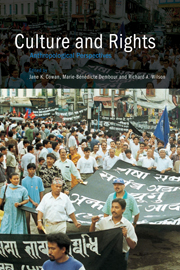Book contents
- Frontmatter
- Contents
- List of contributors
- Preface
- 1 Introduction
- Part I Setting universal rights
- 2 Changing rights, changing culture
- 3 Following the movement of a pendulum: between universalism and relativism
- 4 Imposing rights? A case study of child prostitution in Thailand
- 5 Gendering culture: towards a plural perspective on Kwena women's rights
- 6 Between universalism and relativism: a critique of the UNESCO concept of culture
- Part II Claiming cultural rights
- Index
2 - Changing rights, changing culture
Published online by Cambridge University Press: 05 June 2012
- Frontmatter
- Contents
- List of contributors
- Preface
- 1 Introduction
- Part I Setting universal rights
- 2 Changing rights, changing culture
- 3 Following the movement of a pendulum: between universalism and relativism
- 4 Imposing rights? A case study of child prostitution in Thailand
- 5 Gendering culture: towards a plural perspective on Kwena women's rights
- 6 Between universalism and relativism: a critique of the UNESCO concept of culture
- Part II Claiming cultural rights
- Index
Summary
Introduction
The intense and enduring debate between universalism and relativism in the field of human rights is premised on a fixed and abstract conception of both culture and rights. The debate focuses on the relative merits of adopting a universal system of rights in comparison to protecting cultural diversity. Presented in this fashion, the debate becomes one between culture and rights, in which the natures of both appear uncontested and self-evident. But both concepts are fluid and changing, theoretically as well as empirically. Over the past decade, anthropologists have developed a far more unbounded and contested understanding of culture. The notion of rights deployed within transnational human rights talk has stretched to include a broad range of new meanings well beyond its individualistic European forebear. Meanwhile, globalization and capitalist expansion have transformed local social systems, shifting their repertoires of cultural meanings, while the explosion of the number of international non-governmental organizations (NGOs) and international dialogues and conferences under UN auspices has changed human rights. This chapter explores the changing meanings of both rights and culture and examines how local human rights activists are struggling to create a new space which incorporates both cultural differences and transnational conceptions of human rights.
I became acutely aware of the limitations of conventional thinking about the nature of culture and rights while listening to a panel discussion on violence against women at a 1998 conference in the Solomon Islands.
- Type
- Chapter
- Information
- Culture and RightsAnthropological Perspectives, pp. 31 - 55Publisher: Cambridge University PressPrint publication year: 2001
- 34
- Cited by

